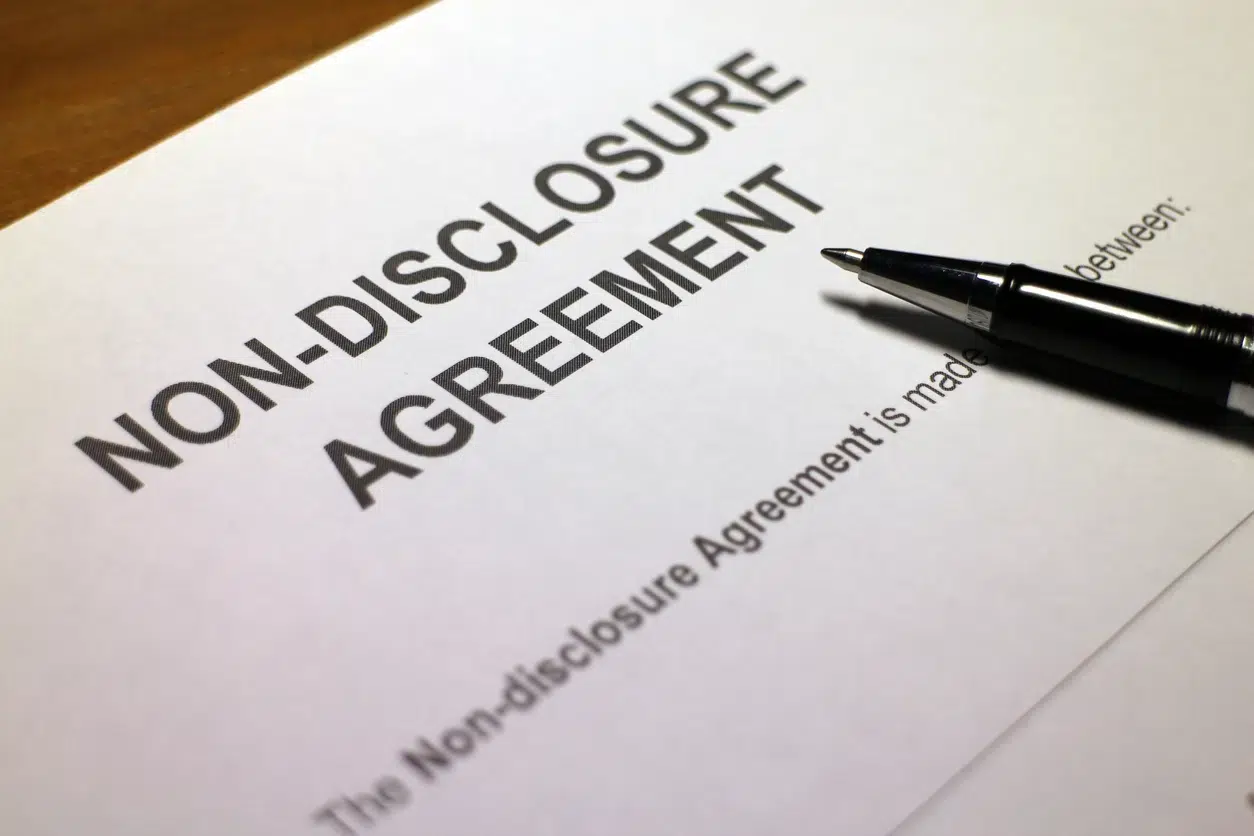
Flat fee structure means no surprise costs.
Custom solutions to protect your legacy.
7 generations in Denton, Texas.
Non-Disclosure Agreement
At Hunter Sargent, PLLC, safeguarding your business interests is our top priority. We understand the critical importance of protecting your sensitive information. Whether you’re a budding entrepreneur in Texas looking to shield your innovative ideas, a corporation entering into strategic partnerships, or an individual requiring a tailored approach to confidentiality, we can help you navigate Texas state law.
Give us a call today to talk about whether you need an NDA to protect your valuable business information.

What is a Non-Disclosure Agreement (NDA)?
Understanding Non-Disclosure Agreements
A Non-Disclosure Agreement (NDA), under Texas state law, is a legally binding contract used to protect sensitive information, trade secrets, or confidential data. When parties sign an NDA, they agree not to disclose or use the protected information for any purpose other than what is outlined in the agreement. NDAs are commonly used in various business contexts, such as employment relationships, business negotiations, and partnerships.
Types of NDAs
In Texas, as in many other jurisdictions, Non-Disclosure Agreements (NDAs) can be categorized based on their scope and the nature of the relationship between the parties involved. Most of these NDAs are used in a business law setting.
Here are the main types:
- Unilateral NDA: This is the most common type of NDA, where one party (the disclosing party) shares confidential information with another party (the receiving party), and the receiving party agrees not to disclose it. This is often used in situations like employer-employee relationships or when a company shares information with a potential investor or partner.
- Bilateral or Mutual NDA: In this type, both parties agree to share confidential information with each other while agreeing not to disclose it to outside parties. This is typical in joint ventures, mergers, or collaborations where both sides have sensitive information to protect.
- Multilateral NDA: This involves three or more parties where at least one party discloses information to the others, and all parties agree not to disclose the information further. This is less common but can be useful in complex business arrangements involving multiple stakeholders.
- Non-Solicitation NDA: While not a pure NDA, this variation often accompanies or includes NDA provisions. It restricts the parties from soliciting each other’s employees, clients, or customers, in addition to protecting confidential information.
It’s essential to tailor the NDA to fit the situation and to ensure that its terms are clear, enforceable, and comply with Texas law. Call us today to talk about whether you need an NDA or how to navigate an existing NDA.
What should be included in an NDA?
So, what are the requirements for your NDA? Under Texas law, NDAs must meet certain legal requirements to be enforceable. These include:
Definition of Confidential Information:
The agreement must clearly define what constitutes confidential information. This can include a range of data, such as technical processes, client lists, business strategies, and other non-public information. It’s important that the definition is not overly broad, as this can render the agreement unenforceable.
Duration:
The NDA should specify the period during which the confidential information must be kept secret. This duration varies depending on the nature of the information and the agreement between the parties. Texas law generally upholds the reasonableness of the duration, considering the nature of the industry and the information being protected.
Scope and Use of the Information:
The agreement must outline the permissible uses of the confidential information. This includes who can access the information and under what circumstances. The scope of use must be reasonable and not overly restrictive.
Exclusions from Confidential Information:
Standard NDAs usually include exceptions to what is considered confidential. For example, information that is already publicly known, independently developed, or rightfully obtained from another source without a breach of confidentiality might be exclude.
Obligations and Duties:
The agreement should spell out the obligations of the receiving party, which typically include steps or measures they must take to protect the confidentiality of the information.
Remedies for Breach:
What if there is a breach of contract? NDAs under Texas law should specify the consequences if the agreement is breached. This often includes provisions for injunctive relief, damages, and, in some cases, attorney fees.
Miscellaneous Provisions:
Depending on the context of your confidentiality agreement, an NDA may include other clauses such as non-compete, non-solicitation, or jurisdiction and governing law clauses. In Texas, these additional clauses must also adhere to specific legal standards to be enforceable.
It’s important to note that Texas courts will evaluate the reasonableness of an NDA’s terms and its impact on public interest, such as the right to work and the free exchange of ideas. Overly restrictive NDAs might be subject to legal scrutiny and could be partially or entirely invalidated if found to be unreasonable.
Individuals or entities looking to draft or sign an NDA in Texas are advised to consult with legal counsel to ensure that their agreement complies with Texas law and adequately protects their interests.
What are common mistakes in NDAs?
Common mistakes made in drafting or executing Non-Disclosure Agreements (NDAs) in Texas, or generally, can impact the enforceability and effectiveness of the agreement. Here are some of these common pitfalls:
- Vague or Overly Broad Definition of Confidential Information:
If the definition of what is considered confidential is too vague or excessively broad, it can make the NDA difficult to enforce. Courts may find such agreements unreasonably restrictive, as they can hinder normal business operations and the free flow of non-sensitive information. - Lack of Specific Duration:
Failing to specify a clear duration for which the confidential information must be kept secret can render an NDA unenforceable. An indefinite duration is often seen as unreasonable. It’s important to set a reasonable, specific period after which the obligation of confidentiality expires. - Neglecting to Address Return or Destruction of Information:
An NDA should outline what happens to the confidential information once the agreement ends or if the relationship between the parties terminates. Without such a clause, handling of the sensitive data post-agreement can become contentious. - Failure to Include Standard Legal Provisions:
Omitting standard clauses such as choice of law, integration, amendment, or assignment provisions can lead to confusion and legal complications, especially if a dispute arises. - Not Identifying Exclusions from Confidentiality:
An effective NDA should clearly state what does not constitute confidential information. This typically includes information that is already publicly available, independently developed, or received from a third party without a breach of confidentiality. Without these exclusions, an NDA can be overly burdensome and potentially unenforceable. - Inadequate Remedies for Breach:
Not specifying the consequences for breaching the NDA can make it difficult to enforce or seek damages. It’s important to outline the legal and financial ramifications of a breach clearly. - Unreasonable or Excessive Restrictions:
Imposing overly harsh or broad restrictions on the receiving party can make the NDA unreasonable and thus unenforceable. Texas courts look for a balance between protecting the confidential information and not unduly restricting business operations or employment opportunities. - Neglecting to Tailor the NDA to Specific Circumstances:
Using a one-size-fits-all approach and not customizing the NDA to the specific situation can lead to gaps in protection or unenforceable terms. - Not Ensuring Mutual Understanding and Agreement:
Both parties must clearly understand and agree to the terms. Misunderstandings or ambiguities can lead to enforcement issues. - Lack of Proper Execution:
An NDA must be properly executed by all relevant parties. Failure to obtain necessary signatures or to follow other formalities can invalidate the agreement.
Avoiding these mistakes involves careful drafting, a clear understanding of the legal landscape, and ideally, consultation with legal experts familiar with Texas law and the specific context in which the NDA is being used.
Do I need an NDA?
When considering the need for a Non-Disclosure Agreement (NDA), the primary factor to evaluate is the nature of the information you plan to share. If this information is sensitive, confidential, or proprietary and provides your business with a competitive edge, such as trade secrets, business plans, or technical know-how, then an NDA is advisable. The context of the information exchange is also crucial. NDAs are commonly used in business negotiations, hiring processes, and while sharing innovative ideas with potential investors or partners.
It’s important to assess the risks associated with unauthorized disclosure. If such exposure could financially harm your business, diminish your competitive standing, or result in the loss of intellectual property rights, an NDA can offer necessary protection. Additionally, consider any legal or regulatory mandates in your industry that might require the safeguarding of certain information.
The nature of your relationship with the other party should also influence your decision. While trust is important, formalizing confidentiality through an NDA can prevent future misunderstandings. Observing the norms within your industry can also guide your decision; in some sectors, NDAs are standard practice.
Another aspect to consider is the potential impact of requesting an NDA on your negotiating leverage. While it can sometimes reflect professionalism and seriousness, in other contexts it might be perceived as overly cautious. If you’re uncertain about the necessity or appropriateness of an NDA, seeking legal advice can provide clarity tailored to your specific situation and industry. Balancing the need for information protection with practical business relationships is key to deciding whether an NDA is the right tool for your needs.
Advantages and Disadvantages
There are many advantages of using an NDA in the right situation. NDAs can:
- Protect sensitive information.
- Provide legal recourse if a party breaks the agreement.
- Define boundaries for confidential information.
- Build trust in business relationships.
- Preserve competitive advantages over competitors.
However, in other circumstances, there can be disadvantages. In the wrong circumstances, NDAs can:
- Provide a false sense of security.
- Limit communication.
- Be difficult to enforce.
- Strain relationships and be overly restrictive.
Hunter Sargent, PLLC Can Help.
Call our law firm today to discuss your business law needs and to protect your proprietary information. We can help you figure out whether an NDA will help your situation or complicate it. We can also make sure that your NDA is enforceable so that you aren’t left in a bind with your valuable business information at risk.


Schedule a meeting now To Start
The best time to plan your legacy was 10 years ago. The next best time is today. Everyone needs estate planning – the good news is it’s never too early and if you’re reading this, it’s not too late.


